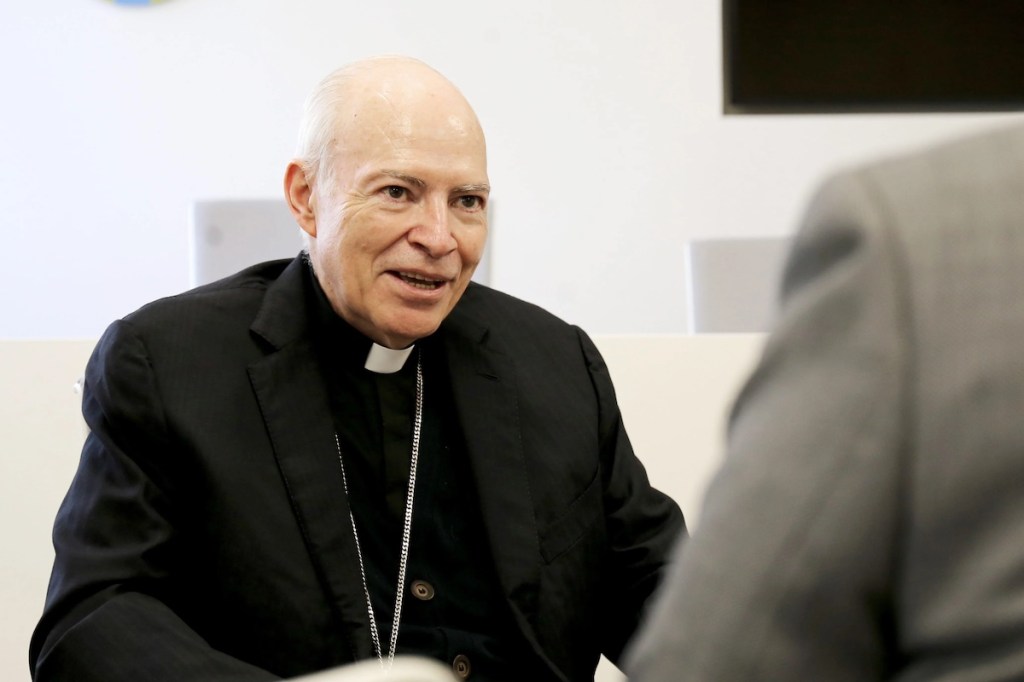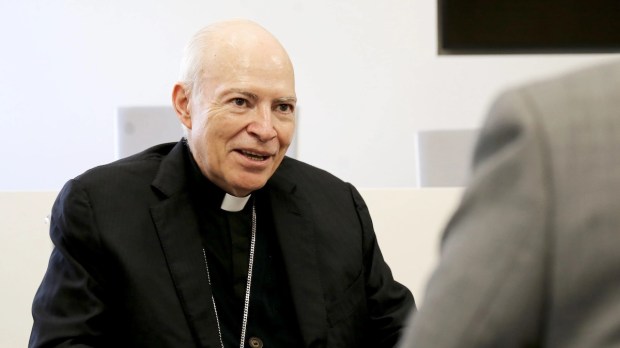The cardinal primate of Mexico, former president of the Mexican bishops’ conference and current archbishop of Mexico City, shares something in common with Pope Francis: Both credit their grandmothers with a key role in forming them in their faith.
Cardinal Aguiar spoke with Aleteia about his life of faith, his spiritual crises, the evangelizing potential of popular piety, and how to settle ecclesial crises like those in Germany.
You recently traveled to Spain to participate in a Congress organized by the CEU San Pablo University which insisted on the importance of testimony. Today, when secularization and religious illiteracy are gaining ground, does personal testimony really matter so much for passing on the faith?
Cardinal Aguiar: Giving testimony with one’s own life is fundamental because it was what Jesus did and it is what we should do as his disciples. Testimony has always mattered, and it was the way the Church was born and grew in the midst of a totally adverse situation. Because the Roman Empire was the exaggeration of self-indulgence in the classes that could afford it, and the others were slaves. In that context, the contrast with Christianity was tremendous.
Encouraging others to live the teachings of Christ has always been impactful, but not only by talking about them; by example.
And you, how do you live your personal relationship with Christ?
Cardinal Aguiar: As a child, one of my grandmothers, who loved me very much and died when I was about to turn 7, took me by the hand to church on many days. At that time there were no Masses in the afternoon, but they always prayed the Rosary and they had exposition of the Blessed Sacrament. And she, pointing to the Tabernacle or the Blessed Sacrament, would tell me: “Look Carlos, son, there’s Jesus. He’s hiding there, in that little box that you see. Talk to him. Tell him what you want, what you think …”
That’s how I learned to pray. Other people learn with established prayers, but I learned from my grandmother that praying is talking with Him. And that has been definitive in my life: I talk with God.

How a cardinal prays
And how do you do it? How does a cardinal pray?
Cardinal Aguiar: I always try to pray in the morning when I wake up, and at night when I go to bed. Also during the day, when I have to talk to someone or make certain decisions, I make the Lord present. And I like to pray the Rosary and spend time at the Basilica of Guadalupe to be with our Mother. That’s why I decided that on Sundays I wasn’t going to celebrate Mass at the cathedral, but at the Basilica. And do you know what Pope Francis told me when I asked him?
What did he tell you?
Cardinal Aguiar: “I’d do the same as you.” (Laughs) For me, the Mass is essential. I celebrate it daily, even if it’s alone, and it helps me to orient my day. That’s why it hurts me when I find priests who celebrate eight or 10 Masses on a Sunday. “The thing is, I don’t have anyone else who can do it,” they tell me. And I understand them, but in those cases, it’s better to celebrate the Word. Because the moment in which one has the Lord in his hands is unique and we priests have to take care of it. If we do it as nothing more than a ritual: raise and lower the chalice, wash your hands … it can’t be.
Of course I go to confession! We priests are equally fragile and need that Grace that heals us.
I won’t ask you about exactly what you say, but do you go to confession?
Cardinal Aguiar: (laughs) Of course, of course! We priests are equally fragile and need that Grace that heals and restores us internally. I have someone I can go to for confession, who is usually a priest with whom I’m friends and we’ve known each other for a long time. In this way we can better outline how to present ourselves before the Lord in situations in which one asks for help to move forward.
The first great crisis of faith
Throughout your life, have you had doubts about your faith or moments of spiritual crisis?
Cardinal Aguiar: Yes, like anyone. The first crisis I remember was deciding whether or not to accept being a priest. I entered the seminary at the age of 11, and as I grew up, the crisis came very strongly to me, because I’m a member of a family of six siblings with parents who loved each other very much, and I had the intense desire to start a family. So, my spiritual director told me, “Let’s see, Carlos: the desire for a family is felt by every human being. The desire to be a priest is not something everyone has. Do you want to be a priest? Yes? And who put it in your heart? Well, you know how you want to answer him, because not everyone has the disposition …” Now I appreciate families very much and I love being with them, but my family is the Church.
The scarlet color worn by cardinals represents being willing to shed blood for the Lord. How do you live your daily martyrdom?
Cardinal Aguiar: I live the cardinalate as an enormous task of service, which implies a great responsibility for me. My martyrdom consists of having to take care of what I say, of my relationships at all levels, and of putting duties first and personal preferences second. But I live it with great gratitude to the Pope and thinking about how the Lord wants me to serve him, which is why he called me. The rest: criticism, gossip, conflicts or acts of rebellion from priests, as long as they have no foundation in truth, don’t concern me. As we say in Mexico, I’m not like a gold coin such that everyone likes me …
We have to remember that synodality is not democracy…
Since you brought it up, is the desire to “be liked by everyone” at the root of problems like the Synod of Germany and those trends that, with the excuse of synodality, ask to change the Magisterium of the Church?
Cardinal Aguiar: In its nature, the Church is synodal. But what does this mean? That we walk together, and that in order to walk together we need mutual listening. But if we discern together it’s to present our discernment to the authority, not to decide on our own. If this is understood, any problem like the one in Germany could be solved.
We have to remember that synodality is not democracy. It is listening to all the voices, discerning together, and making proposals to the parish priest, the episcopal vicar, the bishop, the Episcopal Conference, the Vatican, or the Pope. But proposing, not demanding. And the authority will decide what is and what is not. And that will be accepted. Because synodality is not democracy.
Many times, the popular piety of Hispanics has been viewed with disdain in the face of the supposed “loftiness” of an “intellectual” or “social” faith from Northern Europe. Today, seeing what is happening in those regions, should we value popular religiosity as an anchor to keep Catholics faithful to the Church?
Cardinal Aguiar: That’s right. And popular religiosity is a powerhouse of evangelization not only in Latin America, but also in Africa and in some European countries. Those who experience religious traditions believe in God, and believe that he makes himself present, that he acts and intervenes in the world. It’s an enormous potential that we have to channel towards the teachings of Christ! The challenge is to attend to popular religiosity and use it to make people grow in their knowledge and experience of God.
Channeling popular religiosity well for evangelization
So to transmit the faith in the 21st century, is the typical popular piety of our countries still useful?
Cardinal Aguiar: In Latin America, evangelization implies a combined presence of popular religiosity and the testimony of people who live their faith consistently, or at least want to live it that way. What do I mean by this?
You tell me …
Cardinal Aguiar: Well, many of the baptized can be considered incipient witnesses. Mexicans have, for example, a very strong devotion to Our Lady of Guadalupe, and every time they go to the shrine they feel her presence and her help, in an encounter that makes them feel Christ, sometimes unconsciously. That religiosity is latent in the vast majority of Catholics. But moving on to putting it into practice in life, taking into account the whole of the teachings of Jesus in the Gospels, is a task that we’re working on and that is still small compared to the population as a whole.
In other words, “sociological Catholicism” is an ally of evangelization?
Cardinal Aguiar: If understood well, yes. The latest census data shows that 80% of Mexicans declare themselves Catholic. But a 2010 survey that we bishops carried out showed that, on average across the country, Sunday Mass turnout is 10%. That 10% nourishes itself habitually to have the experience of developing a merciful heart, a testimonial presence … But reaching out to the rest of society is what we need to develop. In short, we need to evangelize.
Baptism, a priceless gift
How can you awaken the evangelizing zeal of that 10%, who are the ones who go after Mass to eat with their in-laws and their friends, who meet their neighbors?
Cardinal Aguiar: That’s exactly the task that we’re trying to promote in Mexico, when we say that we must be a community of witnesses of the presence of Christ in the world. Because Christ lives in our midst – that is, through us – and we Catholics make Christ present. But we need to take this Christ who lives in us into account in prayer, especially in the Eucharist, and in listening to his Word in order to apply it in our daily conduct.
Is there anything I haven’t asked you and that you want to say to end this interview?
Cardinal Aguiar: I want to encourage readers to greatly appreciate that we are baptized. With baptism, we already have a guarantee that we are adoptive children of the Lord, who has adopted us with all his love and tenderness. And if you have a Father who loves you, you have to remember him in the situations of your life. In Mexico, people love to be sprinkled with holy water, and I always try to tell them that it reminds us that we are children of God. Because the divine filiation that God offers us is priceless.


